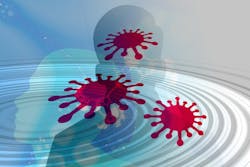NIH begins clinical trial testing remdesivir plus interferon beta-1a for COVID-19 treatment
A randomized, controlled clinical trial evaluating the safety and efficacy of a treatment regimen consisting of the antiviral remdesivir plus the immunomodulator interferon beta-1a in patients with coronavirus disease 2019 (COVID-19) has begun, according to trial sponsor National Institute of Allergy and Infectious Diseases (NIAID), a part of the National Institutes of Health (NIH).
The study, called the Adaptive COVID-19 Treatment Trial 3 (ACTT 3), is anticipated to enroll more than 1,000 hospitalized adults with COVID-19 at as many as 100 sites in the United States and abroad.
ACTT 3 is the third iteration of NIAID’s Adaptive COVID-19 Treatment Trial (ACTT). ACTT began on Feb. 21 to evaluate remdesivir, an investigational broad-spectrum antiviral discovered and developed by Gilead Sciences of Foster City, CA. A preliminary analysis of ACTT data found that patients who received remdesivir had a statistically significant shorter time to recovery compared to patients who received a placebo. These results were published on May 22. More detailed information about the results, including more comprehensive data, will be available in a forthcoming report.
Subcutaneous interferon beta-1a, a medication manufactured by Merck, located in Darmstadt, Germany, is approved in the U.S. and more than 90 other countries for the treatment of multiple sclerosis. The drug is marketed under the brand name Rebif by EMD Serono, the North American biopharmaceutical business of Merck. Interferon beta-1a has the same amino acid sequence as a naturally occurring protein called interferon beta, which is part of a class of proteins called type 1 interferons. Infected cells normally produce type 1 interferons to help the immune system fight pathogens, especially viruses. Interferon beta has both antiviral and anti-inflammatory properties.
Laboratory studies suggest that the normal interferon response is suppressed in some people after infection with SARS-CoV-2, the virus that causes COVID-19. In the laboratory, type 1 interferon can inhibit SARS-CoV-2 and two closely related viruses, SARS-CoV and MERS-CoV. In addition, two small randomized controlled trials suggest that treatment with interferon beta may benefit patients with COVID-19. The combination of interferon beta-1a and remdesivir for treating COVID-19 has not been evaluated in a large, randomized controlled trial.

